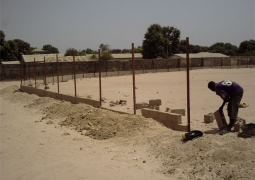The Holy Quran truly teaches the Muslims to listen carefully,, to compare' and to follow only the best path: "... The people who hear different arguments and follow the best thereof are those who are guided by Allah, and they are the wise." (The Quran; XXXlX 18)
Imam Ali (PBUH) once addressing the undecided Muslims about their political leader said: "O people! The judgment is yours. If Mua'vieh is fit for the job more than I, then fix him at the position. And if I am fitter, strengthen my status." Some observers had criticized Imam Ali (PBUH) for having said so, arguing that the comment conveys that the imam was dubious about his right to leadership. In response to this criticism, the imam said, "it is not so. I have absolutely no such doubts. Yet, I have to observe neutrality when inviting the people to judge about myself, and to leave the judgment in that respect up to them. Have you not read the Qur'anic verse? ... And either we or you are assuredly guided ..."
Another point is that the two sides of dialogue must respect each other's viewpoints, and this point is evident from the tone of some Holy Verses, such as: "Revile, not those unto whom they pray beside Allah lest they wrongfully revile Allah through ignorance..." (The Quran; VI, 108)
And also: "Say: You will not be asked of what we committed; nor shall we be asked of what you do." (The Quran; XXXIV, 25)
The peak of beauty of the holy verse is to be sought in selection of the phrases "We have perpetrated" on the one hand "you have done" (a neutral verb) on the other hand.
The Holy Quran considers the influence of those deeds that seem so great in the eyes of one side (and are at the same time difficult to accept for the other side) "Trivial matter", arguing: "... thus unto every nation we have made their deeds seem fair. Then unto their nurturer and Creator they shall return, and he will tell them what they used to do." (The Quran; VI, 108)
C: Topic of a dialogue
The topic of a dialogue needs to be both concrete and real, since if a topic is abstract, or unacceptable for the level of understanding of one side of the dialogue or both it would be useless to hold such a debate. Under such conditions it is necessary to halt the process of dialogue and either to give very general answers to the posed questions, or to totally refrain from answering them. The following Holy Verses refer to the same point:
"They ask you (O Muhammad) of new moons. Say: they are fixed seasons for mankind for performing Hajj pilgrimage ..." (The Quran; II, 189)
"They ask you of the (Destined) Hour and when it would occur. Say only my nurturer and Creator knows about it." (Glorious Quran; Chapter Al-A'araaf (the Heights:187)
"They ask you about the spirit. Say: The Spirit is among the issues exclusively related to my Creator and Nurturer's affairs" (The Quran; XVII, 85)
"And they ask you about the mountains (on Resurrection Day). Say my nurturer and Creator will break them into scattered dust." (The Quran; XX, 107)
The Holy Quran adopts the same approach in holding dialogues towards the people that put forth controversial questions, or very trivial ones, but all the same guides the public to focus on scientific and tangible matters instead: "... As for the foam, it passes as scum upon the river banks, while as for that which is of use to the mankind, it would remain in the earth ... " (The Quran; XIII<17)
Imam Mohammad Ghazali says, "The dialogues must be held on significant matters, or some upcoming event, paying attention to which is worth the time and energy that is to be spent."
D: Dialogue's atmosphere
In order to achieve a positive outcome from a dialogue we need to observe certain conditions. Among them is the observance of morals and literature of dialogue that we already mentioned the related examples in part B: "the two sides of a dialogue."
Another point is the need to refrain from threatening or intimidation one another, since in that case no room would be left for continuation of rational and wise talks.
The best example for the case is the factionary atmosphere that the idolaters had created in the course of talks with the Exalted Prophet of Islam (PBUH). They kept propagating that he was insane. In order to rule out that accusation it would have been no use to resort to sound logic. Therefore, the Glorious Quran directed that Saint (PBUH) to break that poisonous atmosphere as a first step, and only then to provide the situation for the prevalence of thoughts in the next phase:
"Tell them (O Muhammad!): I exhort you unto one thing only: That you should rise for Allah's sake, either in groups comprised of two, or even all alone; then pause to think; there is no madness in your friend {the Prophet}. He is nothing but a warner unto you in face of a terrific doom." (The Quran; XXXIV, 46)
E: Method of Holding Dialogues
The Benevolent Quran points out the main characteristics in this regard. Among them there is flexibility, refraining from prejudice in selecting the methods, and finally, choosing the best paths towards achieving tangible results. Almighty Allah {SWT} says: "Invite to the way of your Nurturer and creator resorting to wisdom and fair exhortation, and reason with them using kind and nice words, and beware! Your Nurturer and Creator is fully aware of them who went astray from His way, and He is well aware of them who went astray from His way, and He is well aware of those who are guided and go aright, (the Quran; XVI, 125)
And
"Tell my servants to use kind words in their speech. And beware! Since Satan sows seeds of discord among them." (The Quran; XVII, 53)
And do not argue with the people of the Scriptures unless you use fine resort to sound logic; save with such of them that are oppressors.(The Quran words and XXXIX, 46)
Another characteristic of a fruitful dialogue is sound and logical reasoning without beating around the bush and refraining from getting involved in endless quarrels. After such a sound process, the negotiator should naturally begin drawing conclusions. There are numerous Qur?anic verses denouncing quarrels and word fights, including: "...They raise not the objection save for beginning another antagonist quarrel. Alas! They are such a contentious folks." (The Quran; XLIII, 58)
And yet, it calls for logical reasoning and sound argumentation, saying: "Say (O Prophet) Present your logic!" (The Quran; XXVII, 64) And it voice strong denouncement against any kind of uneasiness, and bigotry, setting an example for it in this holy verse: "And when they said: O Allah! If this (Quran) is really the Truth from you then rain down stones on us from the sky, or bring on us some painful doom. (The Quran; VIII, 32) and also the Holy Verse: "And Beware! There is a party among them that distort the scripture with their tongues so that you may assume what they say is from the book, while it is not so ..." (The Quran; III, 78)
Another characteristic of a sound dialogue is deleting those elements that in addition to fomenting tension play no role in making easier drawing the conclusions. Almighty Allah (SWT) says: "Say (O Prophet): you will not be asked for what we committed, nor shall we be asked for what you do. (The Quran; XXXIV, 25)
To be continued



